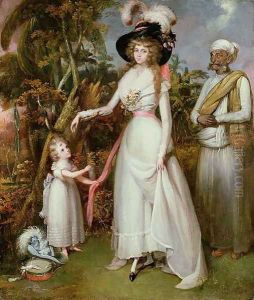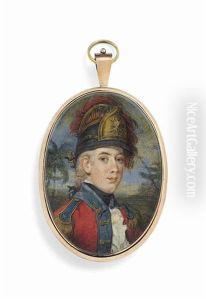John Alefounder Paintings
John Alefounder was an English artist whose life and career spanned the late 18th century, a period that saw significant developments in British art with the foundation of the Royal Academy and the rise of landscape and portrait painting. Born in 1757, Alefounder was primarily known for his work as a portrait painter. Unfortunately, much like many artists of his time and earlier periods, Alefounder did not achieve widespread fame during his lifetime, and as a result, detailed records of his life and work are somewhat scarce.
Despite the lack of extensive documentation, it is known that Alefounder's talent was recognized early on, and he was apprenticed to a painter to develop his skills. He lived and worked during a vibrant period for the arts in Britain, with contemporaries including the likes of Sir Joshua Reynolds and Thomas Gainsborough, who were defining British portraiture and contributing to the cultural landscape of the era.
Alefounder's own contributions to the art world are preserved in a modest number of portraits that reflect the styles and tastes of his time. His works exhibit the attention to detail and the grasp of anatomy that were the hallmarks of skilled portraitists. However, Alefounder's career was cut short when he died in 1795 at the age of 38. The brevity of his life undoubtedly impacted the quantity of his output and the subsequent recognition of his work in the annals of art history.
After his death, Alefounder's work fell into relative obscurity, and he did not receive the same level of posthumous acclaim as some of his contemporaries. Today, his portraits are valuable to historians and collectors for their representation of 18th-century portraiture and as examples of the work of lesser-known artists of the period. While Alefounder may not be a household name, his life and work are part of the broader narrative of English art history, contributing to our understanding of the era's artistic practices and the lesser-known figures who were also part of its rich tapestry.

